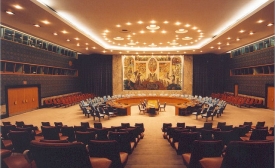united nations
The U.N. special rapporteur on freedom of religion or belief on Thursday spoke out against intolerance toward religious groups such as Falun Gong and the Baha'is, remarks that irritated China.
Despite no-expenses-spared efforts to boost its soft power, such as the Shanghai Expo and plans to open a Xinhua news agency office atop a skyscraper in New York's Times Square, China's image has taken a beating in recent months, what with its tough talk to the United States and Japan, its defence of North Korea and, now, its attacks on the Norwegian Nobel Committee for honouring imprisoned dissident Liu Xiaobo.
Joy erupted within the establishment in New Delhi late on Tuesday evening as news arrived from New York regarding India's election to a non-permanent two-year Asian seat in the United Nations Security Council. A dutiful media ecstatically tagged along. The infectious excitement was not without good reason.
LAST Sunday, it emerged that the UN was set to appoint a Malaysian astrophysicist called Mazlan Othman to lead international efforts to respond to visitors from outer space. As the article in the Sunday Times explained, Dr Othman is the head of the UN’s Office for Outer Space Affairs (Unoosa).
The freedom section of President Obama's address to the United Nations General Assembly yesterday deserves applause -- two cheers at least. It was the most extensive, fulsome, and compelling defense of human rights and democracy of his presidency, and it strategically placed political freedom in the context of economic freedom and development.
President Obama on Wednesday unveiled a policy directive that defines the pursuit of global development as a “core pillar of American power.” Under the directive, development and foreign assistance are for the first time elevated to the level of key factors in US national security and economic policy.
The Clinton Global Initiative, now in its sixth year, will feature Nobel laureates, CEOs, presidents, and a trio of first ladies—making it seem like a 21st century initiative that could ultimately eclipse the older institution. CGI is fast building a track record that has some wondering if its leaner model may be the better way to address the multitude of problems facing the global community.

This project examines why and how sovereign states use public diplomacy in the pursuit of a non-permanent seat on the United Nations Security Council (UNSC). The research for this project draws upon the experience of middle power Australia, a founding member and longstanding supporter of the UN, with aspirations to sit at the UNSC table.







